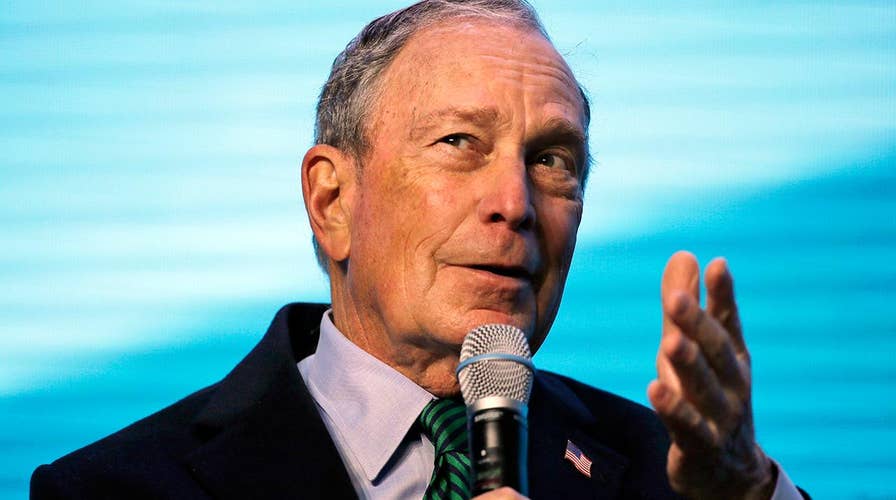Bloomberg skyrockets to third place in new national poll
How is the Democrat race shaping up ahead of Iowa?
The curious campaign of Michael Bloomberg raises a question: Can a billionaire buy the Democratic nomination? In his late bid for the nomination that skips the first four contests, which historically launch the nominee, Bloomberg has placed a big bet that big bucks can overcome all.
Bloomberg has a history of short-circuiting the traditional political process and winning. The hallmarks of his victorious mayoral races in New York City were an overwhelming financial advantage, a blizzard of ads that saturated the airwaves, piecing together a disparate coalition, and little personal contact with voters.
In 2001, Bloomberg, a Democrat, ran for mayor as a Republican, winning by spending $75 million of his own money on the campaign and outspending his opponent five to one. Bloomberg also ran on the ballot line of the Independence Party and created another one called Students First. Combined, that coalition provided Bloomberg 59,000 votes in his narrow 50-48 win.
Clearly, the road map Bloomberg is traveling for the 2020 presidential race is rooted in his races for mayor. Bloomberg is banking on a fractured Democratic contest with a series of different winners in Iowa, New Hampshire, South Carolina and Nevada. He hopes to wrestle the nomination from all of them on Super Tuesday, the 20-state delegate palooza, on March 3. To date, Bloomberg has spent a gobsmacking $167 million on ads alone. Just ads. That doesn’t include personnel, organization, offices, materials, travel and all the other costs associated with any campaign.
CLICK HERE TO GET THE OPINION NEWSLETTER
But Bloomberg’s approach also avoids the usual vetting of candidates by voters and the media. It avoids the rigor of the campaign, the questions of voters and their opinions about you. The test of whether you’re ready for office is running for it. When you run for president people view you as a blank slate that will be filled by your performance during the campaign. In this case, voters look at Bloomberg, not as the former mayor of New York City. Rather, is he the best person to replace Donald Trump? Is he up to the task? Can he beat him? What will Bloomberg do if he wins?
More from Opinion
The first four states require retail campaigning. But it is the New Hampshire primary, win or lose, that predicts the conduct of the next president in the White House. Bill Clinton came in third by overcoming a sex scandal that was repeated in the White House. George W. Bush was viewed as being in over his head when he lost the primary and that foreshadowed his engaging in ill-considered wars based on the advice of others.
Barack Obama lost in New Hampshire after winning in Iowa, a sign that voters were pumping the brakes to test him and his confidence. It was similar to the tests he faced during his two terms. Finally, Donald Trump won New Hampshire on the match and gasoline of “working-class fury” and immigration and stuck to those themes as president.
It is clear Bloomberg only engages with those of his choosing on his terms rather than the voters for whom he would work if elected president.
By skipping the first four contests, Bloomberg is denying voters the chance to learn what kind of person he is and the president he would be. For example, in New Hampshire, with its strong history of electing women to office, voters might want to know where he stands on #MeToo issues and why he refuses to release women from non-disclosure agreements.
Those questions have been posed to Bloomberg elsewhere and met with chilly replies and outright dismissal. New Hampshire voters might like to explore these issues, which could define Bloomberg’s candidacy and potential presidency. But they won’t get the chance.
Furthermore, Bloomberg won’t be participating in the Democratic debates and he doesn’t hold open town hall meetings. His campaign events have been tightly controlled photo ops. There was the tour of Texas with door knocking in Houston that was so staged it appeared to be a performance and a bus tour with select reporters along for the ride. It is clear Bloomberg only engages with those of his choosing on his terms rather than the voters for whom he would work if elected president.
CLICK HERE TO GET THE FOX NEWS APP
The number one issue for Democrats is beating Trump. Do Democrats want to take a chance on someone who refuses to be vetted by them? How do you know Bloomberg can do it when he won’t be tested like the other candidates? If Bloomberg won’t be judged by the voters while he’s running for president, isn’t it likely that he would govern in the same imperious manner? Is that the answer to our woes in the wake of Trump?
After three years of a reality TV show host running the country, do Democrats want to pick a nominee they only know from TV? Really?

